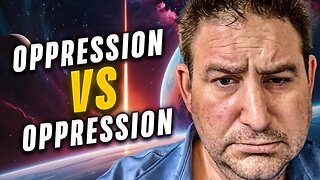Premium Only Content

Why So Many in Gen Z Prefer Social Media Over Real Life Experiences?
The phenomenon where a significant portion of Generation Z prefers their digital existence on social media to real-life interactions has multifaceted roots, among which the propagation of "woke" ideologies plays a nuanced role. Here's how these dynamics intertwine:
The Allure of Digital Identity: Social media platforms offer Generation Z a canvas to craft identities that might feel more controllable than their offline selves. Here, "woke" ideologies, focusing on issues like identity politics, social justice, and personal expression, find fertile ground. These platforms become stages where identity isn't just self-discovered but also publicly validated through likes, shares, and comments.
Propagation of Woke Ideologies: On social media, woke ideologies spread rapidly due to their often viral nature, emphasizing inclusivity, diversity, and awareness of social issues. However, this propagation can lead to an echo-chamber effect where questioning one's identity becomes not just common but encouraged. For some in Gen Z, this constant questioning morphs into identity confusion, where the line between online personas and real-life identity blurs.
Addiction and Identity Confusion: The design of social media, with its endless scroll and reward mechanisms, fosters addiction-like behaviors. When intertwined with the quest for identity, this can lead to a cycle where young individuals are perpetually online, seeking affirmation but often encountering conflicting views that challenge their self-perception. This scenario can exacerbate feelings of instability regarding one's identity.
Mental Health Implications: The continuous exposure to idealized lives, the pressure to conform to or rebel against rapidly changing social norms, and cyberbullying can contribute to mental health issues. Among these, cluster B personality disorders, known for dramatic, overly emotional or unpredictable thinking or behavior, might find a peculiar breeding ground in the volatile social dynamics of online spaces. Furthermore, there's anecdotal mention of temporary psychosis-like symptoms where reality and online personas clash dramatically, leading to acute but transient mental disturbances.
While social media and woke ideologies aren't inherently detrimental, their intersection with Gen Z's life has led to significant identity exploration but also confusion and addiction. The digital world offers tools for self-expression and social connection but at the potential cost of mental health stability, where the quest for identity can sometimes lead to psychological distress. Addressing this requires a balanced approach, encouraging digital literacy, mental health awareness, and fostering environments both online and offline where identity can be explored healthily and constructively.
In today’s digital age, social media has become more than just a pastime for Gen Z—it’s their primary window to the world. But why are so many young people choosing the virtual over the tangible? This video breaks down the key reasons: from the allure of instant gratification, the pull of curated online identities, to the pressure of staying constantly connected. We’ll dive into the psychology behind this preference, how it impacts their mental health and relationships, and whether these trends suggest a lasting shift in how we define “experience.”
Keywords & Tags: Gen Z and social media, virtual experiences, real life vs online, social media impact, digital age, mental health Gen Z, instant gratification, online identity, real-life interactions, social media addiction.
Explore why this generation often favours the screen over in-person moments and what this shift means for the future.
Why So Many in Gen Z Prefer Social Media Over Real Life Experiences?
-
 4:00
4:00
The Problem With Being Awake
2 days agoOppressed vs Oppressor is an Incorrect Statement of Mind - The Drama Triangle Lays This Out Neatly
4 -
 51:58
51:58
PMG
9 hours ago $2.01 earned"Can the Government Learn from Elon Musk’s 70% Labor Cut? A Deep Dive into Inefficient Agencies"
31.7K -
 6:39:15
6:39:15
Amish Zaku
8 hours agoRumble Spartans #10 - New Year New Maps
28.9K2 -
 1:04:58
1:04:58
In The Litter Box w/ Jewels & Catturd
1 day agoNo Tax On Tips! | In the Litter Box w/ Jewels & Catturd – Ep. 722 – 1/17/2025
149K32 -
 5:35:39
5:35:39
Dr Disrespect
15 hours ago🔴LIVE - DR DISRESPECT - WARZONE - CRAZY CHALLENGES
170K33 -
 1:16:30
1:16:30
Edge of Wonder
11 hours agoLA Fire Updates: Miracles Amidst the Devastation
44.4K14 -
 54:54
54:54
LFA TV
15 hours agoBanning Mystery of the Ages | TRUMPET DAILY 1.17.25 7pm
37.9K8 -
 1:47:13
1:47:13
2 MIKES LIVE
8 hours ago2 MIKES LIVE #168 Open Mike Friday!
32.5K3 -
 1:05:11
1:05:11
Sarah Westall
9 hours agoMysterious Fog and California Wildfires Both Contain Dangerous Elements w/ Dr Robert Young & Hazen
53.1K7 -
 1:40:48
1:40:48
Mally_Mouse
8 hours agoLet's Play!! -- Stardew Valley pt. 23!
28.6K